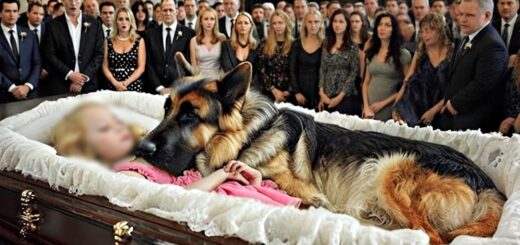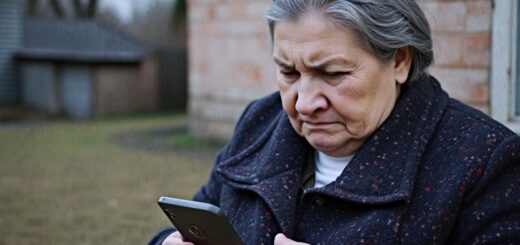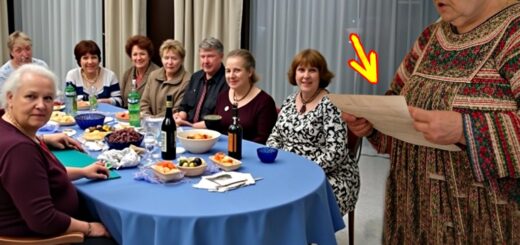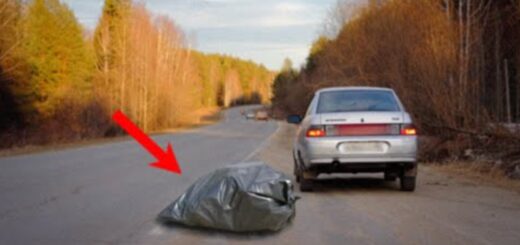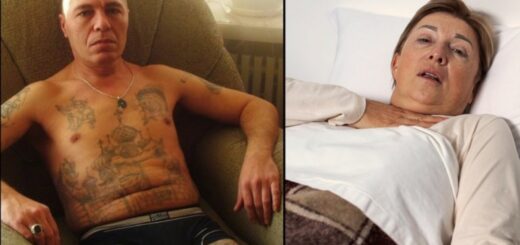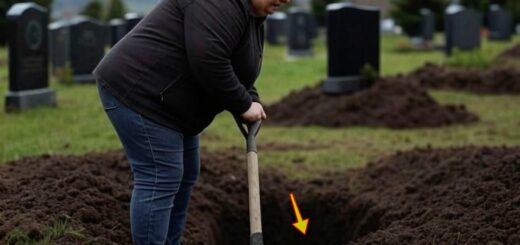“Dad isn’t dead, he’s under the floor,” the little girl said, police started digging…
I know. Back in the therapy room, Lucy continued gently. Who put Daddy under the floor, Anna? Mommy, the girl said, her tone like she was telling a fairy tale.
What did Mommy do to Daddy? Mommy told him, be quiet. Then she picked up the pan. She hit him hard.
Daddy stopped moving. Lucy quickly jotted down some notes. Were you scared? Anna looked down.
I wasn’t allowed to be scared. Mommy said if I told anyone, the whole family would fall apart. Then she cried.
I was scared of her crying. Lucy put her pen down and took a deep breath. This was a clear case of post-traumatic stress disorder.
The girl hadn’t just witnessed a death she had been forced into silence. A weight far too heavy for a four-year-old child to bear. That night, back at Carol’s home, Anna returned from her therapy session.
She didn’t eat much dinner. Instead, she sat and quietly drew. Carol tiptoed over to see.
In the picture was a man this time standing beside a small girl, holding a balloon. Who is this, sweetheart? That’s Daddy, Anna replied. He’s not cold anymore.
He has a balloon. Carol was speechless, hugging her granddaughter tightly. But that night, while Anna slept, she cried in her dreams, calling out, Don’t leave me, Daddy, don’t let Mommy shut the door.
Carol held her through the night, unable to close her eyes for even a minute. The next morning, Dr. Lucy arrived at the police station at Rose Martin’s request to provide a psychological assessment. I can’t bring the child in as a formal witness, Lucy began, but Anna’s statements are highly consistent and match the facts uncovered during the investigation.
She described the timeline, the location of the body, and Martha Grant’s actions with precise detail. Rose asked, Does she show signs of fear toward her mother? Not a typical fear, Lucy replied. It’s fear of losing love.
Fear of betraying her mother. Children often still believe their mothers love them no matter what they’ve done. Mark asked, Can we use her drawings as a form of emotional evidence in court? Lucy thought for a moment.
Legally, no. But emotionally and socially, they carry weight. If the court agrees, I can testify as an expert witness to explain the psychological impact this event had on the child.
Rose nodded. I’ll request the drawings be added to the case file. That afternoon, a journalist named Scott Vincent known for his investigative reporting approached Mark with a proposal.
Chief Rivers, I’ve heard about the Martha Grant case. I’d like to write a feature story. I won’t name the child I just want the public to understand that some children get pulled into crimes no one notices.
Mark considered. As long as you don’t cause Anna any more harm, you may access non-confidential information. Scott nodded.
I’d like to title it, Dad Under the Kitchen Floor, A Child’s Truth. Mark looked at him for a long moment and said softly, Write it with your heart. Not just your pen.
At the detention center, Martha received her daughter’s psychological report, delivered by her attorney, Victor Anderson. The girl is undergoing long-term therapy. She still calls you mommy, but her sleep is filled with nightmares.
She says you hit her dad with a pan. That you told her to stay silent. Martha’s hands trembled.
She … remembers. Victor was blunt. She doesn’t just remember.
She draws it. Every tile. Every word you said.
What have you left your daughter, Martha, besides a childhood buried in concrete? Martha bit her lip until it bled, but didn’t respond. Late that night, Mark sat alone in his office. On his desk was a stack of Anna’s drawings—all of kitchen floors, burlap sacks, a figure lying down, or shadowy shapes.
He gently touched one page—a drawing of two people, a little girl crying, and an adult slumped beside her. In the corner of the page, Anna had written in wobbly letters, I miss daddy. Mark sighed and wrote in his investigation journal, It’s not just adults who carry pain.
Sometimes, the smallest ones bear the heaviest truths. And they more than anyone are the first to name evil with the most honest voice, Daddy is under the kitchen floor. For days after Martha was officially indicted, Mark’s investigation team received a detailed financial report from the Central Bank of the State of Illinois.
The file was over 50 pages long, listing all of Martha Grant’s transactions during the three months leading up to the crime. Richard Monroe flipped through each page. He frowned when he saw a repeated pattern of cash withdrawals always at 2 a.m., the same time Martha claimed she couldn’t sleep and went grocery shopping.
But no store was open at that hour. She wasn’t shopping, Richard said firmly. She was paying someone or buying materials off the books.
Mark nodded. Cross-check with ATM machine locations near her home. Look for surveillance cameras within a three-kilometer radius.
Three hours later, a young officer named Nathan Rogers returned with footage from an ATM just two blocks from Martha’s house. In it, Martha wore a hat and dark glasses, withdrawing over $8,000 in cash at 2.16 a.m. exactly three days before Julian went missing. Mark looked at Richard.
Cash. No trail. In the middle of the night.
She was preparing for something no one could know about. Richard added, or preparing for a life without Julian. Prosecutor Rose Martin expanded the investigation by sending an official request to the Federal Property Registry.
They needed to confirm the ownership of the house Martha and Julian lived in. The report came back, the house was fully owned by Julian, inherited from his father, and listed in his name prior to the marriage. Martha had no legal claim to it.
Mark reviewed the document and said gravely, the motive is glaring. If Julian divorced her, she would lose the house, the child, everything. Murder was the only way to keep it all.
Rose nodded. We also need to examine her relationship with Samuel Brooks more closely. Even if he wasn’t directly involved, he may have been an emotional catalyst.
Samuel Brooks was summoned a second time. This time, there was no coffee, no water, no smiles. Mark and Rose sat across from him in a cold, gray room lit by harsh fluorescent lights.
We’ve reviewed your phone, Rose began. There are hundreds of messages between you and Martha. In one, she says, I’ll be free soon.
Wait for me. And you replied, don’t do anything you’ll regret. Samuel swallowed hard.
I didn’t know about the murder. But you knew Julian was filing for divorce. Mark pressed.
Yes. Martha told me. She said Julian was going to take Anna…



